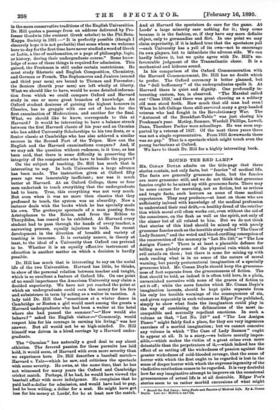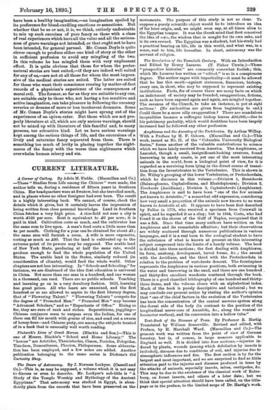ROUND THE RED LAMP.* MIL CONAN DOYLE admits on the
title-page that these stories contain, not only facts, but " fancies " of medical life. The facts are generally gruesome facts, but the fancies are more gruesome still, and we do not think that gruesome fancies ought to be mixed up with gruesome facts. There may be some excuse for narrating, not as fiction, but as serious and tragic facts, such horrors as some of these medical experiences. They may produce,—at least on those who are sufficiently imbued with knowledge of the medical profession to understand their real drift,—a healthy dread of the retribu- tion which moral evil often works out, even without the aid of the conscience, on the flesh as well as the spirit, not only of the sinner but of all related to him. But we do not think that stories of this kind should be mixed up with purely gruesome fancies such as the horrible story called "The Case of Lady Sanwa," and the weird and blood-curdling conception of the resurrection of the mummy in "Lot No. 249," or" The Los Amigos Fiasco." There is at least a plausible defence for telling men plainly some of the physical ruin which moral evil entails on them ; but there is none for mixing up with such reading what is in no sense of the nature of moral warning, but purely preternatural imagination of a specially gruesome kind. Mr. Conan Doyle should keep the gruesome- ness of fact separate from the gruesomeness of fiction. The first should be told, as indeed it is often told here, in a plain, unvarnished narrative with none of the graces of fiction to set it off ; while the mere fancies which Mr. Conan Doyle's imagination invents, should be kept quite separate from his only too terrible warnings of the consequences of sin, and given separately in such volumes as Edgar Poe published, simply to show what feats the imagination could play in the way of combining the delineations of the most in- compatible and mutually repellent emotions. In such a volume as that, "Lot No. 249" and "The Los Amigos Fiasco" might fairly find a place, for they are very ingenious exercises of a morbid imagination; but we cannot conceive any volume in which "The Case of Lady Sannox " ought to appear at all. It is a story,—we believe morally impos- sible,—which makes the victim of a great crime even more detestable than the perpetrators of it,—which indeed has the effect of so setting off the wickedness of passion against the greater wickedness of cold-blooded revenge, that the sense of horror with which the first ought to be regarded is lost in the sense of deeper horror with which the supreme ingenuity of the vindictive retribution comes to be regarded. It is very doubtful how far any imaginative attempt to improve on the occasional gruesomeness of actual life is at all desirable. Edgar Poe's stories seem to us rather morbid excursions of what might
• Sound the Red Lamp being Pacts and Fancies of Medical Life. By A. Conan Doyle. Lou, 01 bietbnm awl Co.
have been a healthy imagination,—an imagination spoiled by its preference for blood-curdling emotions or sensations. But whether that be so or not, it is, we think, entirely undesirable to mix up such exercises of pure fancy as these with a class of real experiences which have all the value and all the serious- ness of grave warnings not intended, or that ought not to have been intended, for general perusal. Mr. Conan Doyle is quite clever enough to produce either one kind of story or the other in sufficient profusion to avoid any mingling of the two. In this volume he has mingled them with very unpleasant effect. It is quite obvious that those for whom the preter- natural stories are best suited,—if they are indeed well suited for any of us,—are not at all those for whom the most impres- sive of the medical stories are suited. The latter are suited for those who want their conscience rousing by matter-of-fact records of a physician's experience of the consequences of moral evil. The former, so far as they are suitable to any one, are suitable only to those who, not having a too sensitive and active imagination, can take pleasure in following the uncanny reveries or dreams of more or less incoherent dreamers. Some of Mr. Conan Doyle's stories might have sprung out of the experiences of an opium-eater. But those which are not pro- perly literature at all, which are only serious warnings, should not be mixed up with literature of this fanciful and, to many persons, too attractive kind. Let us have serious warnings kept among the serious things of life, and the excursions of a lively and saturnine fancy separated from them. There is something too much of levity in placing together the night- mares of the fancy with the worse than nightmares which overwhelm human misery and sin.



































 Previous page
Previous page